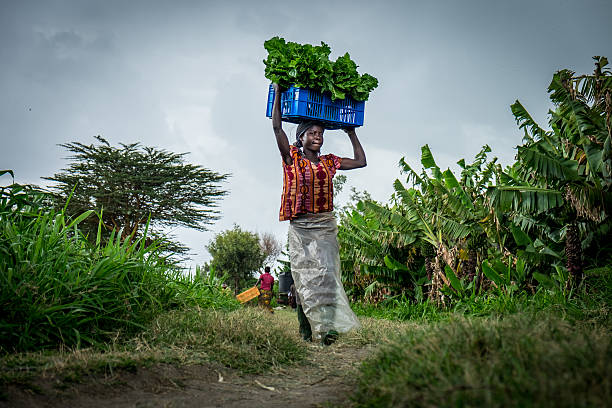

In an era where environmental challenges and climate change are at the forefront of global concerns, the concept of sustainable agriculture has gained unprecedented significance. Sustainable agriculture and food systems are essential not just for feeding the world’s growing population but for ensuring that our food production methods contribute positively to the environment and society. This article delves into the principles, practices, and benefits of sustainable agriculture and food systems, highlighting their importance in shaping a greener and more equitable future.
Understanding Sustainable Agriculture
Sustainable agriculture is a holistic approach to farming that seeks to balance the need for food production with the need to protect the environment, preserve resources, and support the well-being of farmers and communities. It involves practices that are economically viable, environmentally sound, and socially responsible.
Key Principles of Sustainable Agriculture:
- Environmental Stewardship: Sustainable agriculture emphasizes minimizing the negative impact on the environment. This includes reducing soil erosion, conserving water, and decreasing pollution from agricultural runoff.
- Resource Efficiency: Sustainable farming practices focus on using resources like water, energy, and soil in the most efficient way possible. Techniques such as crop rotation, cover cropping, and reduced tillage help maintain soil health and reduce resource depletion.
- Biodiversity: A diverse ecosystem is crucial for resilience and productivity. Sustainable agriculture promotes the use of a variety of crops and livestock breeds, which enhances biodiversity and supports ecological balance.
- Economic Viability: For agriculture to be truly sustainable, it must also be economically viable. This means ensuring that farming practices are profitable for farmers while also being affordable for consumers.
- Social Responsibility: Sustainable agriculture recognizes the importance of fair labor practices, community engagement, and the health and well-being of farmers and their families. It aims to create a supportive and equitable environment for all stakeholders involved.
Sustainable Food Systems: Beyond the Farm
While sustainable agriculture focuses on farming practices, sustainable food systems encompass the entire food supply chain—from production to consumption. This broader perspective includes:
- Food Processing and Distribution: Sustainable food systems prioritize minimizing waste and reducing energy consumption in processing and distribution. This involves adopting energy-efficient technologies and sustainable packaging solutions.
- Local and Seasonal Consumption: Encouraging the consumption of locally produced and seasonal foods helps reduce the carbon footprint associated with long-distance transportation. It also supports local economies and reduces reliance on global supply chains.
- Waste Management: Effective waste management practices, such as composting and recycling, are integral to sustainable food systems. Reducing food waste not only conserves resources but also helps alleviate food insecurity.
- Consumer Education: Educating consumers about sustainable food choices and the impact of their dietary habits is essential. Awareness campaigns can encourage more sustainable eating patterns, such as reducing meat consumption and choosing organic or sustainably sourced products.
Innovative Practices in Sustainable Agriculture
Several innovative practices are transforming sustainable agriculture and helping to address the challenges faced by traditional farming methods:
- Agroecology: This approach integrates ecological principles into farming practices, focusing on creating resilient and self-sustaining agricultural systems. Agroecology promotes practices like polycultures, natural pest control, and soil fertility management.
- Precision Agriculture: Utilizing technology such as GPS, sensors, and data analytics, precision agriculture optimizes the use of inputs like water and fertilizers. This reduces waste and environmental impact while enhancing crop yields.
- Regenerative Agriculture: Regenerative agriculture goes beyond sustainability by aiming to restore and enhance soil health, sequester carbon, and improve ecosystem services. Techniques include no-till farming, cover cropping, and holistic grazing management.
- Vertical Farming: Vertical farming involves growing crops in stacked layers or vertical towers, often in urban settings. This method reduces the need for large land areas and can minimize transportation-related emissions.
Challenges and Opportunities
While the benefits of sustainable agriculture and food systems are clear, there are challenges to overcome. Transitioning to sustainable practices can require significant investment, knowledge, and changes in existing systems. However, these challenges also present opportunities for innovation and collaboration.
- Policy and Support: Government policies and incentives play a crucial role in supporting sustainable agriculture. Providing financial assistance, research funding, and educational resources can help farmers adopt and maintain sustainable practices.
- Research and Development: Continued research into sustainable farming techniques, crop varieties, and technologies is essential for advancing the field. Collaboration between researchers, farmers, and industry stakeholders can drive innovation and improve outcomes.
- Community Engagement: Engaging communities in the transition to sustainable food systems is vital. This includes involving consumers, local organizations, and businesses in efforts to promote sustainability and support local agriculture.
Conclusion
Sustainable agriculture and food systems are pivotal in addressing the environmental, economic, and social challenges of our time. By embracing principles of environmental stewardship, resource efficiency, and social responsibility, we can cultivate a food system that not only meets the needs of today but also safeguards the well-being of future generations. As we move forward, it is essential to continue exploring innovative practices, supporting research, and fostering community engagement to build a more sustainable and resilient food system for all.
